
Volume XVII, Issue 27 # July 2 - July 8, 2009 |
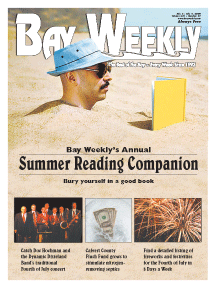 |
Bury Yourself In a Good Book
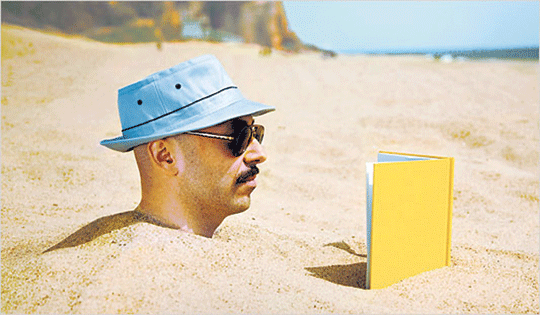
Bay Weekly’s Annual Summer Reading Guide
Nothing reads like a mystery. It needn’t be a murder mystery to pin you with hunger to the pages of a book. All the best stories stir us with the same questions, working up an appetite of wonder that’s insatiable until the last page. How did it come to this? What forces gave our hero these powers? Or our villain these perversities? Is there any getting out of this predicament? How?
Here, for your summer 2009 reading pleasure, Bay Weekly’s family of readers recommends books they’ve found irresistible. We bet you will too.
–Sandra Olivetti Martin
Louis Bayard
Calendar Editor Diana Beechener uses her sleuthing skills to find evidence that her dog Soze sneaks naps on the good couch.
The facts of the case are these: In 1830, a young cadet is found swinging from a  h
h![]() angman’s noose on the grounds of West Point. A few hours later, while guarded in the cold storage facility, the cadet’s heart is sliced out.
angman’s noose on the grounds of West Point. A few hours later, while guarded in the cold storage facility, the cadet’s heart is sliced out.
Desperate to avoid a scandal, the brass of West Point shanghai retired New York detective Gus Landor into solving the crime. To keep an eye on the investigation, the Point’s captain offers Landor an assistant, one of the academy’s best and brightest.
Correctly surmising that West Point’s best and brightest will act as a spy for the brass, Landor instead chooses as his assistant West Point’s worst and dimmest: an odd, lanky boy named Edgar Allen Poe.
The Pale Blue Eye is standard who-done-it with standard twists and turns. What makes the novel exceptional is Bayard’s fictionalized portrait of Poe during his ill-spent years as a West Point cadet. Playing Watson to Landor’s Holmes, Poe isn’t a tragic poet so much as an historic version of the mall-rats you see hanging around Hot Topic: Gangly pale limbs, lacquered hair and a dark outlook. Spouting overwrought poetry and mooning over metaphoric tragedies, Poe is a test of sanity for the pragmatic Landor.
As Poe helps Landor dig deeper into the mystery, the detective watches the boy transform into the tragic artist with a true understanding of despair. Or is the young poet’s dramatic personality a clever act that disguises his darker nature?
Perfect reading for midnights dreary.
Anthony Bourdain
Margaret Tearman, who has been writing for Bay Weekly for five years, lives in Huntingtown with her husband Tom and three dogs. She is serious about the pleasures of food.
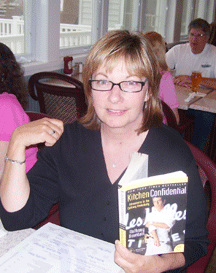
![]() Just beyond view and out of earshot, exhausted, over-heated border-line madmen (and women), white frocks blood-spattered, swing finely honed, deadly sharp cleavers with bone-shattering thwacks. It is not a safe place. It is hot. It is mysterious. And to the uninitiated, it is sometimes dangerous.
Just beyond view and out of earshot, exhausted, over-heated border-line madmen (and women), white frocks blood-spattered, swing finely honed, deadly sharp cleavers with bone-shattering thwacks. It is not a safe place. It is hot. It is mysterious. And to the uninitiated, it is sometimes dangerous.
Chef Anthony Bourdain spills the beans — perhaps sometimes too many — on the back room culture of a restaurant in his bestselling non-fiction (yes, he claims it is all true) Kitchen Confidential.
With 25 years of experience in restaurant kitchens, from dishwasher to head chef, Bourdain has plenty of juicy tales to tell. In his words, the commercial kitchen is a sex- and drug-crazed environment where only a few survive, a job so grueling most of us would wither away after just one lunch rush.
After reading this book, I do more than contemplate a restaurant menu. Now before placing my order I wonder, Would Bourdain eat this? wracking my brain to remember what he had to say about eating fish on Monday, Sunday brunches and mussels.
Kitchen Confidential is a delicious read, even if it is sometimes a bit gross. Bourdain has a wicked sense of humor and makes no bones about his colorful past. His self-effacing honesty, however troubling at times, is the main reason I love this book.
Mary Crow Dog and James P. Owen
Mick Blackistone is an award-winning author whose latest book is Remembering You. In May, he was named editor of the Waterman’s Gazette for the Maryland Watermen’s Association.
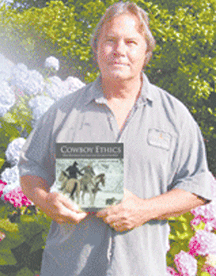 I
I![]() ’m still hooked on Robert B. Parker novels, and I still mix my summer reading with thoughtful and thoughtless reading.
’m still hooked on Robert B. Parker novels, and I still mix my summer reading with thoughtful and thoughtless reading.
Having been rocked by one damaging revelation of misbehavior after another, Wall Street is in crisis. Investors are disgusted, and every firm finds its integrity open to question. Regulators are up in arms, and the financial industry is looking at a flood of new regulation. Now, what if Wall Street firms looked back to a simpler time when a handshake sealed a deal, and right and wrong were as clear as black and white?
James P. Owen’s Cowboy Ethics: the Code of the West explores the life and code of the working cowboy and how those values can cause change, one person, one firm, and one organization at a time. Awesome photographs, too!
In Lakota Woman, Mary Crow Dog recounts the hardships she was forced to endure as a Native American woman growing up on the Rosebud Sioux Reservation in South Dakota, from her birth in 1953 through to her joining AIM, the American Indian Movement, which “was born out of the civil rights movement.” She describes taking over the Bureau of Indian Affairs building in Washington in 1973, the second Wounded Knee in the same year and how her husband, Leonard Crow Dog, and AIM revived the Indian Spirit and ancient Indian religion and ceremonies. While this book is the story of one woman’s life and struggles with poverty, brutality — of not just the government, but also male Indians — alcoholism, drug abuse and loss, it is also the story of many.
Ivan Doig
Dotty Holcomb Doherty fell in love with Montana while researching mountain goats in Glacier National Park. When not visiting western mountains or deserts in person, she enjoys roaming these landscapes in novels.
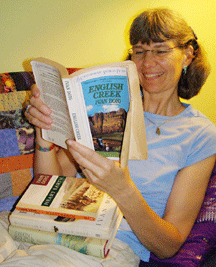
![]() My copy of Ivan Doig’s English Creek tells its own story. This hard-worn paperback sports deep food stains from backpacking trips. Doig is worth carrying.
My copy of Ivan Doig’s English Creek tells its own story. This hard-worn paperback sports deep food stains from backpacking trips. Doig is worth carrying.
In his two memoirs and 10 novels, Doig seeks, in his own words, “to work at stretching the craft of writing toward the areas where it mysteriously starts to be art.” A masterful storyteller whose poetry underlies his prose, Doig sweeps us into lives made real by their complexity, language and ties to place. He returns to his childhood home at the base of Montana mountains in his memoirs, his Two Medicine trilogy beginning with English Creek, and in one of his newest novels, The Whistling Season, in which a widower’s teenage son wrestles with the challenges of growing up a scholar on a post-war ranch aided by a new school teacher, the mysterious brother of his family’s hired-by-mail housekeeper.
In Doig’s newest, The Eleventh Man, a military propaganda newspaper turns a newly winged WWII pilot into a war correspondent to herald the frontline stories of his championship football team buddies.
Having recently devoured these latest two novels, I now plan to spend the summer rereading all my battered Doig’s.
Brendan Dubois
Jane Elkin is a New Hampshire native and friend and high school classmate of the author.
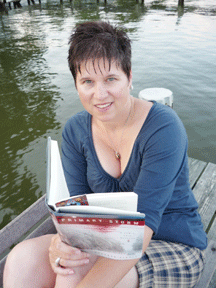
![]() Winter on New Hampshire’s rocky seacoast is usually the dead season, and that’s the way former government operative Lewis Cole likes it, except when dead could mean him. In Primary Storm, award-winning mystery novelist Brendan Dubois embroils his reclusive writer-hero in a plot to assassinate the presidential campaign’s front-runner, who just happens to be married to Cole’s college sweetheart. Not that he’s thought about her for 20 years; he’s moved on, but that doesn’t save him from suspicion. It’s a mystery and a love story all packed into an adventure populated with a cast of colorful characters from the extremes of society.
Winter on New Hampshire’s rocky seacoast is usually the dead season, and that’s the way former government operative Lewis Cole likes it, except when dead could mean him. In Primary Storm, award-winning mystery novelist Brendan Dubois embroils his reclusive writer-hero in a plot to assassinate the presidential campaign’s front-runner, who just happens to be married to Cole’s college sweetheart. Not that he’s thought about her for 20 years; he’s moved on, but that doesn’t save him from suspicion. It’s a mystery and a love story all packed into an adventure populated with a cast of colorful characters from the extremes of society.
Dubois, who is native to the area, understands better than any other author the comedy of culture clash that is the New Hampshire primary. Left-wing activists and right-wing extremists, the well-to-do and ne’er-do-wells, libertarians and vegetarians all cross paths with comic effect in this action-packed social commentary.
Whether you’re a policy wonk or just a spectator to the country’s biggest media circus, if you beat the heat this summer with a retreat to New England’s icy beaches, you may find yourself coming back for more in the five other adventures of the Lewis Cole series.
Timothy Eagen
“As far from the water as possible, but my most compelling book of the past year: very readable,” says Ricky Rood, climatologist, University of Michigan professor, Bay Weekly contributor and author of the Rood Weather Underground Climate Blog: www.wunderground.com/blog/RickyRood/show.html.
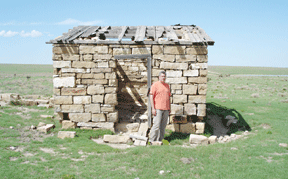
![]() In the panhandle of Texas in the 1930s, the sheriff collected roadkill to feed the townspeople. People died of the dust they could not keep out of their house; they dug cars out of the drifts. The color of the dust told the direction of the wind. The Worst Hard Times is an interview-based history of those who survived the Dust Bowl.
In the panhandle of Texas in the 1930s, the sheriff collected roadkill to feed the townspeople. People died of the dust they could not keep out of their house; they dug cars out of the drifts. The color of the dust told the direction of the wind. The Worst Hard Times is an interview-based history of those who survived the Dust Bowl.
The land of the western plains was plowed and farmed for wheat, pushed to extremes by World War I and government policy. Railroad companies and land developers claimed that rain followed the rail: If you plowed, then you would be blessed with rain. Scientists began to unveil the fact that this land could not hold together, could not stay on Earth if it was plowed for wheat, for corn. It was made for buffalo grass, with short leaves and massive roots. Skeptics claimed that mere men could not be the cause of the dust. Today, there are buried houses across eastern Colorado, rusting windmills, stone WPA buildings, alone, miles from anything else.
The Worst Hard Times is compelling, with lessons to be learned, today, about our need to take care of the Earth.
Bay Weekly intern Sara Newman is a rising junior at University of Maryland.

![]() In the 1930s there was Nancy Drew, and in the ’50s there were the Hardy Boys. Now, instead of reading mystery novels, detective wanna-be’s can create their own non-fiction mysteries through the popular social networking website, Facebook.
In the 1930s there was Nancy Drew, and in the ’50s there were the Hardy Boys. Now, instead of reading mystery novels, detective wanna-be’s can create their own non-fiction mysteries through the popular social networking website, Facebook.
Facebook is comparable to a personal newyorktimes.com, where you can constantly update your page with recent events and details about your lives. You can be as open or as discreet as you wish, though many prefer to be open with their public and be recognized rather than hardly seen.
There are status updates, where you can broadcast what you’re doing at that moment, an About Me section where the Facebooker can describe personal music, film and book interests as well as education and employment. Pictures and conversations with friends complete the book.
The News Feed, similar to an AP Wire, provides constant updates from friends, ranging from what someone is eating at that moment to where someone will go on vacation next week. Curiosity is fed through entering the real lives of those you knew or wish you knew. The mystery is just a click away.
Has Facebook taken reading from the fictitious lives within novels to the public lives of acquaintances or old high school classmates? After all, real life has always been more dramatic than novels.
George MacDonald Fraser
Ben Miller, a Bay Weekly contributor, interpreted history, which he was required to take seriously, for the National Park Service.
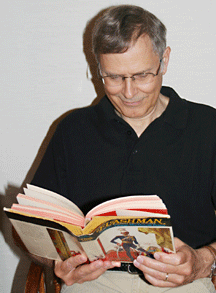
![]() For historical dramas with a salacious twist, you can’t do better than the Flashman series of novels by British writer George MacDonald Fraser, who died January 2, 2008.
For historical dramas with a salacious twist, you can’t do better than the Flashman series of novels by British writer George MacDonald Fraser, who died January 2, 2008.
Harry Flashman is an antihero who, despite (or because of) being a self-confessed coward and bounder, survives some of the most famous military blunders of the 19th century — the Charge of the Light Brigade, the Battle of Little Bighorn — and many other wars beside.
Knighted and decorated, he retires in comfort (thanks to judicious looting) to write his memoirs. And entertaining memoirs they are.
Flashman pops up everywhere. He meets just about everyone — including Abraham Lincoln (who saw through him) and Bismark (who tried to kill him).
Flashman postures and cringes (when necessary) from the far reaches of the British Empire to the Arizona frontier, but his redeeming feature is that he describes his posturing and cringing with brutal honesty. Flashman paints a no less sparing and accurate a portrait of the people and places of his time.
One could do worse — while being marvelously entertained — than turning to Sir Harry Flashman to learn the history of Afghanistan (Flashman), China (Flashman and the Dragon), Russia (Flashman at the Charge) and India (Flashman in the Great Game).
Alan Furst, Robert B. Parker and John Sandford
Sandra Olivetti Martin is Bay Weekly cofounder and editor; life-long book reader, hungry for plot and plots; time-and-a-half journalist; spare-time book editor.
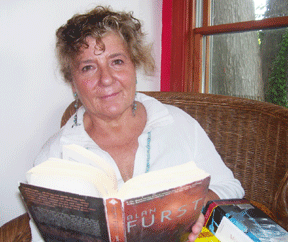 I
I![]() am reading happily courtesy of the advice of Mick Blackistone and Dennis Doyle in earlier Bay Weekly Summer Reading Guides. Though compulsively is closer to the truth than happily. For the three authors they’ve recommended have become addictions. Unless one is in my hands or ears, I get itchy; my palms sweat. But when the book and I are connected, I don’t need anything else. Except to keep reading.
am reading happily courtesy of the advice of Mick Blackistone and Dennis Doyle in earlier Bay Weekly Summer Reading Guides. Though compulsively is closer to the truth than happily. For the three authors they’ve recommended have become addictions. Unless one is in my hands or ears, I get itchy; my palms sweat. But when the book and I are connected, I don’t need anything else. Except to keep reading.
Alan Furst, recommended by Dennis Doyle, was the first to capture me, with the universe compressing on his dark heroes as Europe tumbles and bumbles into World War II. If war is good for anything, it’s good for fiction, where the contrast of good against evil makes the villains vile and the rest of us better than we might be in a better world.
My conversion has been slower to John Sandford and Robert Parker, the recommendations of Mick Blackistone. Very nasty villains drive the action in all their books. But as in Furst, the battle betters the heroes, and you step into their worlds and skins — though Blackistone is welcome to Parker’s Spenser; I’ll take his other heroes.
Furst writes the best sentences, but the others know their way around the page. Each has written many books, so you can keep reading without fear of famine.
Tim Harford and David Ball
Sandy Lee Anderson grew up in the West — Colorado, Oregon and Arizona — joined the Peace Corps to teach in Turkey, then settled down with the D.C. Public Schools, Department of Planning before retiring with a view of the Bay in St. Leonard.
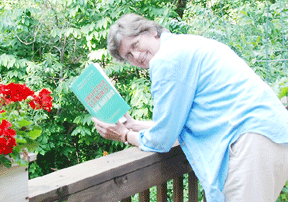
![]() My eye-opener book is The Undercover Economist. Author Tim Harford unveils the economics that affect everyday events. For example, Starbucks offers a variety of drinks so I can pay more if I’m willing; price doesn’t reflect their costs. And grocery stores make more by raising and lowering prices than keeping them the same. Harford spins the story of traffic jams, the stock market and how to solve health care and clean air challenges. It’s unbelievable how economists have the inside scoop on why. Now I’m in on their secrets.
My eye-opener book is The Undercover Economist. Author Tim Harford unveils the economics that affect everyday events. For example, Starbucks offers a variety of drinks so I can pay more if I’m willing; price doesn’t reflect their costs. And grocery stores make more by raising and lowering prices than keeping them the same. Harford spins the story of traffic jams, the stock market and how to solve health care and clean air challenges. It’s unbelievable how economists have the inside scoop on why. Now I’m in on their secrets.
A pure adventure, David Ball’s Ironfire grabbed me by the first sentence and didn’t let go. “Malta, 1551: On the morning the slavers came …” The boy, Nico, is captured, then manages to escape. He converts to Islam to avoid execution and becomes a captain in the Turkish sultan’s armada. His sister, Maria, escapes the slavers to live under the tyranny of the priests of the Knights of St. John. As Christian and Muslim forces engage in battle, the siblings try to survive and outwit these equally treacherous regimes. Throughout this epic spellbinder I never knew who would prevail.
John Le Carré
Dennis Doyle is the award-winning Sporting Life columnist for Bay Weekly. He is also the husband of noted Annapolis sculptor Deborah Banker and the father of three boys.
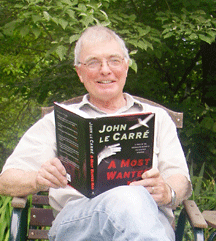
![]() John Le Carré, one of the finest cold war espionage writers of the last 50 years, has found a new source of intrigue. Enter Issa Karpov, an emaciated, disturbed, half-Russian, half-Chechen youth who somehow escaped (or did he?) a succession of prisons.
John Le Carré, one of the finest cold war espionage writers of the last 50 years, has found a new source of intrigue. Enter Issa Karpov, an emaciated, disturbed, half-Russian, half-Chechen youth who somehow escaped (or did he?) a succession of prisons.
A devout Muslim possessing an inordinate amount of cash and the code to a secret bank account and bearing the scars, both mental and physical, of professional-grade torture, Issa has been smuggled into Hamburg in the dead of night by an unknown hand.
With the aid of Annabelle Richter, a young German civil rights lawyer, he seeks out Scottish banker Tommy Brue.
Tommy’s family bank in Hamburg has been holding vast sums of questionable money deposited over many years by Issa’s father, a Russian colonel now deceased. Issa claims not to want his father’s money, but he believes Tommy to be his savior.
Issa’s presence also exudes, to some, the scent of a terrorist mission.
Protected only by the banker and the young attorney, the damaged youth becomes the target of the spies of three western nations.
Will he prevail? Or will he be smashed by the relentless and reckless machines of the collective spy services?
Yiyun Li
Dick Wilson is Bay Weekly’s veteran proofreader, when he’s not traveling the world to exotic scuba diving locations or to study Spanish in Costa Rico, where he and wife Ellie have a second home.
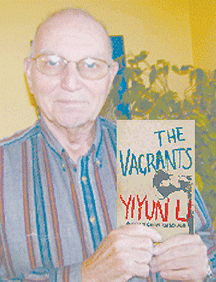
![]() It’s a small village. The 1970s is the tail end of a dark period in modern Chinese history. The Cultural Revolution has turned Chinese society into a carnivorous entity that feeds on itself.
It’s a small village. The 1970s is the tail end of a dark period in modern Chinese history. The Cultural Revolution has turned Chinese society into a carnivorous entity that feeds on itself.
The village is poor, and its people are concerned mostly with survival. They must tolerate the tyranny that oppresses them, but for the most part they treat one another with kindness and respect.
Yiyun Li’s 2009 novel The Vagrants portrays the village people as they confront a tragic event: A young woman, the daughter of the respected Teacher Gu and his wife, is to be executed. What is her crime? “Counter-Revolutionary Activity.”
Despite the pending event, the life of the village proceeds with little disruption, except that people, being human, do things that might put themselves in jeopardy. This is where the author shows mastery of her craft: She portrays the horror in stark contrast to the humanity that refuses to be subjugated.
It’s not a pretty picture; the nuts and bolts of Chinese Communist “justice,” as portrayed here, are brutal. But we see how otherwise honorable people can become complicit in such savagery. And the author also shows that, no matter what, people will always remain free in ways that “they” can’t take away. This, perhaps, is the mystery.
Nathaniel Philbrick and Lawrence Durrell
Longtime contributor M.L. Faunce will have more time for reading and listening to books after she retires this summer.
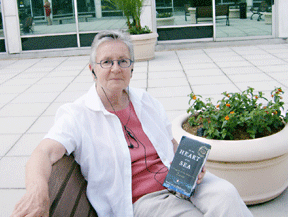
![]() If I were going to read one book about the Bay, the sea, the river or the lake this summer, it would most likely be to re-read the British novelist Lawrence Durrell’s Alexandria Quartet, which I first read lying on the sand at Rehoboth Beach. Don’t let the tetralogy put you off; it’s summer, you have time to linger over four perspectives on a single set of events and characters, a fetching, languid, spicy, modern love story set in Alexandria, Egypt, before World War II. The quartet is a perfect beach, boat and Bay read, full of summer heat lightening.
If I were going to read one book about the Bay, the sea, the river or the lake this summer, it would most likely be to re-read the British novelist Lawrence Durrell’s Alexandria Quartet, which I first read lying on the sand at Rehoboth Beach. Don’t let the tetralogy put you off; it’s summer, you have time to linger over four perspectives on a single set of events and characters, a fetching, languid, spicy, modern love story set in Alexandria, Egypt, before World War II. The quartet is a perfect beach, boat and Bay read, full of summer heat lightening.
But if I wanted to get soaking wet, shiver my timbers and count my lucky stars that I was not on board a ship, I would again listen to the audio version of In the Heart of the Sea, The Tragedy of the Whaling Ship Essex by Nathaniel Philbrick. An Irish friend loaned me this audio tape a few years ago, and from the start I was riveted to this tale of tragedy as I drove each morning up Bay Front Road from Deale to the District to work, for once not wanting my commute to end.
On hot summer mornings, I lived and breathed this high-seas adventure, with griping details of whitewater 40 feet wide and an 85-foot angry bull sperm whale that scuttled the Nantucket ship’s plan for a South Pacific landing, scattering its crew adrift in small boats. It was 1819, mind you, and the battle for survival was won only by the fittest. The fate of the Essex crew weighed heavy in my car that summer commute and still lives vividly in my memory.
Ishmael Reed
Ariel Martinez Brumbaugh, waitress and poet aspirant, has risen from junior reporter to humorist at Bay Weekly.
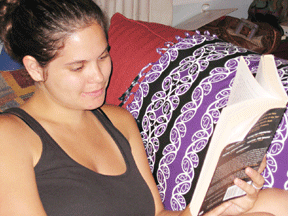
![]() Sweet summer slipping by, and I have a single minute to read. Between work and more work, the time I spend relaxing needs to leave me fulfilled. A great book of poetry does just that. From Totems to Hip Hop is a collection of poems spanning the last century arranged and edited by award-winning poet Ishmael Reed. This poetic anthology is different from the standard boring stuff of a freshman English class. Reed’s collection was gathered with controversy and politics in mind. Pass Reed’s ramblings about American academic hypocrisy, and you find gold in his thinking. “Why can’t T.S. Eliot and Tupac Shakur and Bob Holman, all in this anthology, be studied together? They’re all homies.”
Sweet summer slipping by, and I have a single minute to read. Between work and more work, the time I spend relaxing needs to leave me fulfilled. A great book of poetry does just that. From Totems to Hip Hop is a collection of poems spanning the last century arranged and edited by award-winning poet Ishmael Reed. This poetic anthology is different from the standard boring stuff of a freshman English class. Reed’s collection was gathered with controversy and politics in mind. Pass Reed’s ramblings about American academic hypocrisy, and you find gold in his thinking. “Why can’t T.S. Eliot and Tupac Shakur and Bob Holman, all in this anthology, be studied together? They’re all homies.”
Of course the real pleasure is in the poems themselves, including some of Reed’s own work. The contents are arranged categorically in chapters such as Nature and Place, Men and Women and, my favorite, Heroes and Sheroes, Anti and Otherwise. Pick a chapter and scan for a mood adjuster. If you’re feeling stressed, check out Thulani Davis’ “Skin of Clouds.” If you want inspiration, try May Swenson’s “Weather.” Or if you are feeling daring, open the book anywhere and let fate suck you in.